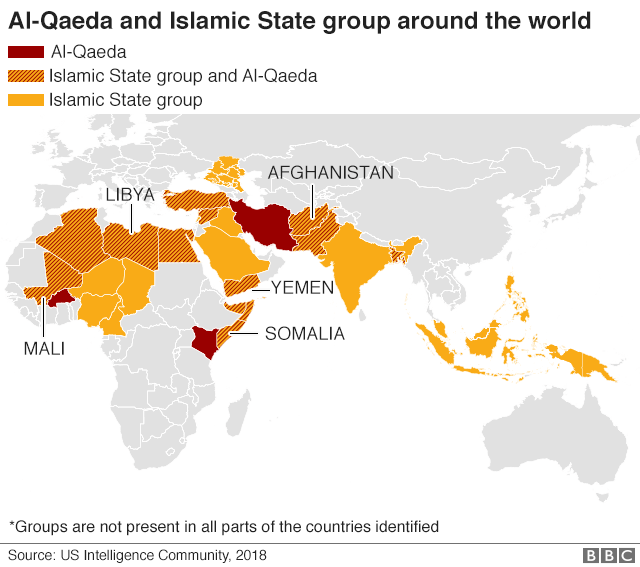
Hamza Bin Laden, the son of al-Qaeda founder Osama Bin Laden, has reportedly been killed in an air strike, eight years after his father died in an attack in Pakistan by US forces.
How important was Hamza Bin Laden? And is al-Qaeda still influential?
He was widely seen as the emerging leader of al-Qaeda after his father was killed by US special forces in Pakistan in 2011.
In 2015, al-Qaeda's current leader, Ayman al-Zawahiri, introduced the 30-year-old Hamza as a "lion from the den" of the Bin Laden network.
He had been promoted as a rising star on pro-al-Qaeda websites, someone it was hoped would reinvigorate the group.
With the death of Osama Bin Laden in 2011 and the emergence of the Islamic State group (IS), al-Qaeda's power and influence weakened considerably.

But in recent years, al-Qaeda has been pursuing a strategy of quietly rebuilding and forging alliances with regional groups.
In a report in January, US National Intelligence warned that senior al-Qaeda leaders are "strengthening the network's global command structure and continuing to encourage attacks against the West and the United States."
The UN, in a report published earlier this year on the threat of global terrorism, said that al-Qaeda "appears to be growing more ambitious…it remains resilient and active in many regions and retains the ambition to project itself more internationally."
In February this year the UK's intelligence chief, Alex Young, also warned of a resurgence of al-Qaeda.
Part of its new strategy has been to build local alliances, and foster a network of affiliates or "branches" in Africa, the Middle East and South Asia.
Unlike IS, al-Qaeda has been careful not to alienate local populations.
In 2013 al-Qaeda issued "General Guidelines for Jihad" which talked about a more restrained and community-based approach.
"Al-Qaeda has made an art of homing in on local concerns, like corruption or marginalisation, and slotting them into its agenda of global jihad", according to Elisabeth Kendall, senior fellow at Pembroke College, Oxford.
"In so doing, it acts a a local 'saviour' and positions itself as 'the good guys of jihad' as opposed to the brutal thugs of IS," she says.
Al-Qaeda has been steadily increasing its attacks through its various branches and affiliates.
In 2018, it carried out a total of 316 attacks around the world, according to data collected by The Armed Conflict Location & Event Data Project.
Its last major attack in a Western country was the Charlie Hebdo shooting in Paris in January 2015 in which 12 people died. The attack was carried out by Al-Qaeda in the Arabian Peninsula.
But its affiliates have been very active in other parts of the world, carrying out deadly attacks.
The Somali-based group al-Shabab carried out an attack in 2013 against a shopping mall in Nairobi which killed at least 67 people.
Data as of August 2018
Al-Shabab has continued to attack Kenyan towns along the border with Somalia, including a 2015 raid on Kenya's Garissa University that killed 148.
It was also responsible for a major attack in October 2017 in Mogadishu that left nearly 600 dead.
And in January 2019, the group attacked a hotel complex in the Kenyan capital Nairobi, killing at least 15 people.